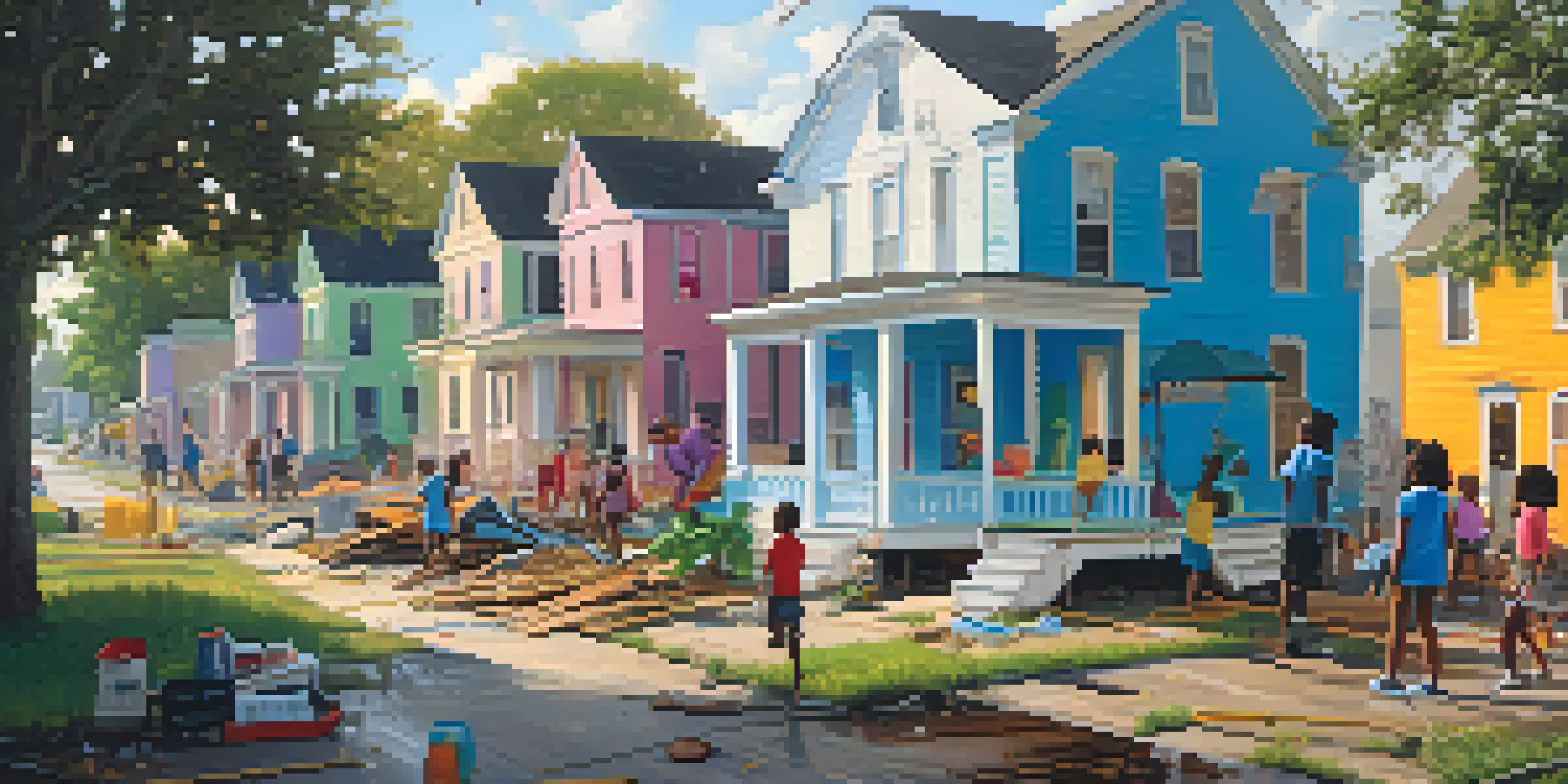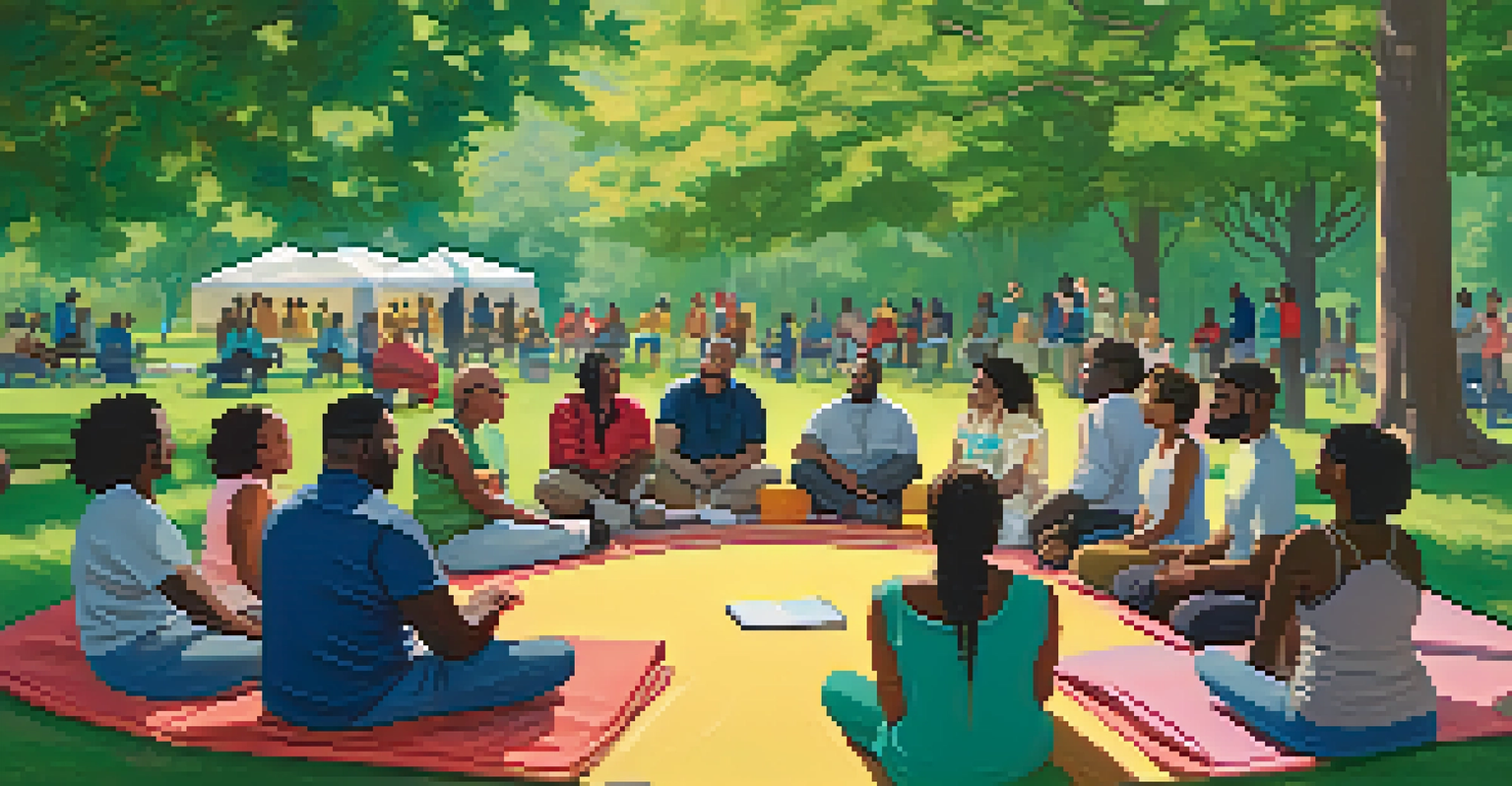Mental Health Effects of Hurricanes in Louisiana

The Unique Mental Health Landscape in Louisiana
Louisiana is no stranger to hurricanes, with its coastline facing the brunt of these powerful storms. This vulnerability creates a unique mental health landscape, where residents often face the aftermath not just of physical destruction but also psychological trauma. The culture, rich in resilience and community spirit, plays a significant role in how individuals cope with these disasters.
0Mental health is not a destination, but a process. It's about how you drive, not where you're going.
In a state where family ties and community bonds are strong, the psychological effects of hurricanes can ripple outwards, impacting entire neighborhoods. Many residents rely on each other for support, which can help mitigate feelings of isolation. However, this reliance can also create pressure to appear strong, leading individuals to suppress their mental health struggles.
Understanding Louisiana's mental health landscape means recognizing both the challenges and strengths of its people. The combination of frequent natural disasters and a vibrant cultural identity creates a complex backdrop that influences how residents experience and respond to mental health issues.
Immediate Psychological Impacts of Hurricanes
When a hurricane makes landfall, the immediate aftermath can be overwhelming. Residents often experience acute stress reactions, which can manifest as anxiety, panic attacks, or even post-traumatic stress disorder (PTSD). These responses are natural, given the life-threatening situations and the chaos that ensues during and after such events.

Moreover, the loss of homes, possessions, and even loved ones can lead to profound grief and depression. For many, the storm isn't just a weather event; it's a life-altering experience that challenges their sense of safety and stability. These immediate psychological impacts can linger long after the winds have died down.
Hurricanes Impact Mental Health
Hurricanes create both immediate and long-term psychological effects, such as anxiety and depression, that can alter residents' quality of life.
It's essential to recognize these immediate effects as part of a broader mental health crisis that can unfold in the months and years following a hurricane. This understanding can help communities and mental health professionals provide timely support to those in need.
Long-Term Mental Health Consequences
While the immediate effects of hurricanes are often visible, the long-term mental health consequences can be just as severe, yet less obvious. Research indicates that individuals who experience hurricanes may face prolonged anxiety and depressive symptoms long after the storm has passed. This can affect their daily lives, relationships, and overall quality of life.
The greatest weapon against stress is our ability to choose one thought over another.
Furthermore, the stress of rebuilding and recovery can exacerbate these mental health challenges. As residents navigate insurance claims, temporary housing, and the daunting task of restoring their homes, feelings of frustration and helplessness can deepen. This ongoing stress can lead to chronic mental health issues if not addressed.
The long-term consequences highlight the importance of ongoing mental health support in the aftermath of hurricanes. Communities need access to resources that help individuals process their experiences and rebuild their lives, emotionally and physically.
The Role of Community Support
Community support can be a powerful buffer against the mental health impacts of hurricanes. In Louisiana, neighbors often come together, sharing resources and offering emotional support, which can significantly alleviate feelings of isolation. This communal resilience is a testament to the strength of Louisiana’s culture, where people look out for one another.
Support groups, often formed in the wake of disasters, provide a safe space for individuals to share their experiences and feelings. These groups can help normalize the conversation around mental health, encouraging individuals to seek help and connect with others who understand their struggles. Community events, such as local gatherings or fundraisers, can also foster a sense of belonging and hope.
Community Support is Vital
Strong community bonds in Louisiana provide essential emotional support, helping individuals cope with the mental health challenges post-hurricane.
However, it's crucial to recognize that not everyone may feel comfortable seeking help within their community. Some individuals might prefer professional support, highlighting the need for accessible mental health resources alongside community initiatives.
Barriers to Mental Health Treatment
Despite the availability of community support, many individuals face barriers when seeking mental health treatment after a hurricane. Stigma around mental health issues can prevent people from reaching out for help, as they may fear judgment or being perceived as weak. This barrier can be particularly pronounced in close-knit communities where appearances matter.
Additionally, logistical challenges, such as lack of transportation or limited access to mental health professionals, can hinder individuals from obtaining the care they need. The aftermath of a hurricane often leaves communities grappling with resource shortages, and mental health services may not be prioritized in recovery efforts.
Addressing these barriers requires a multifaceted approach that combines community awareness, education, and improved access to mental health care. By creating an environment that encourages open discussions about mental health, Louisiana can foster a culture where seeking help is seen as a strength, not a weakness.
The Importance of Mental Health Awareness
Raising awareness about the mental health effects of hurricanes is crucial for fostering resilience in Louisiana communities. Education initiatives can inform residents about the potential psychological impacts of disasters and the importance of seeking help. This knowledge empowers individuals to recognize their own mental health needs and those of their neighbors.
Mental health awareness campaigns can also work to reduce stigma, encouraging more people to talk openly about their experiences. When individuals see public figures or community leaders discussing mental health, it can inspire them to share their own stories and seek support. This creates a ripple effect, promoting a culture of understanding and compassion.
Barriers to Mental Health Care
Stigma and logistical challenges often prevent individuals from seeking necessary mental health treatment after hurricanes.
Furthermore, integrating mental health considerations into disaster preparedness plans can help communities respond more effectively in the wake of a hurricane. By prioritizing mental well-being alongside physical recovery, Louisiana can build a more resilient future.
Resources for Mental Health Support
In the aftermath of hurricanes, it's vital for Louisiana residents to know where to find mental health support. Various local organizations and hotlines provide resources for those struggling with their mental health, offering counseling, support groups, and crisis intervention. Accessing these resources can be a critical step toward recovery and healing.
Additionally, community centers often host workshops and events focused on mental health awareness and coping strategies. These gatherings provide opportunities for residents to connect with mental health professionals and learn valuable skills for managing stress and anxiety. They also reinforce the importance of community support in the healing process.

For individuals who may prefer online resources, many organizations offer virtual counseling and support groups, making it easier to access help from home. It's essential for residents to take advantage of these resources and prioritize their mental health as they navigate the challenges that come with hurricane recovery.